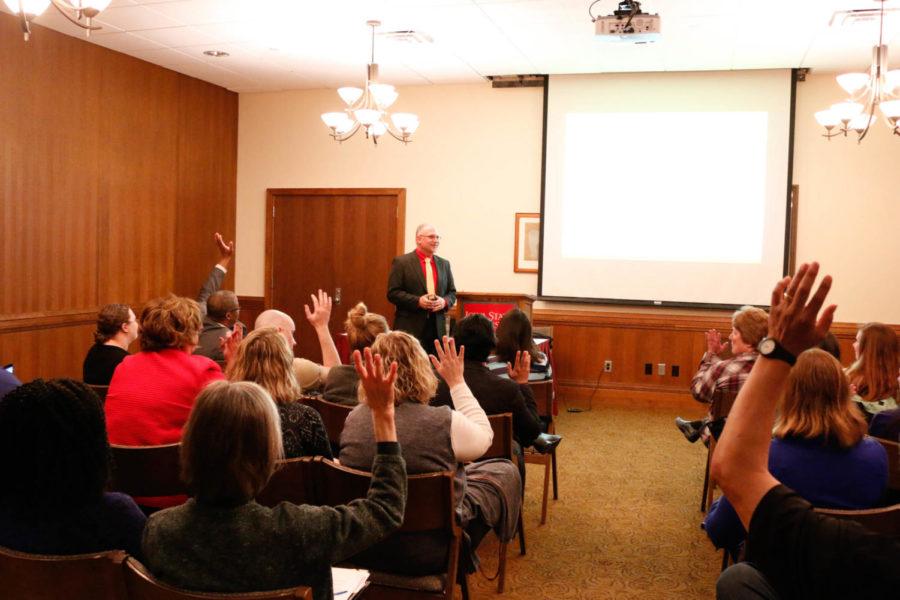Search for new director of Student Counseling Services begins
Jack MacDonald/Iowa State Daily
Thomas Berry, the director of the counseling and counseling psychology clinic at Oklahoma State University, delivers a speech in the Gold Room at the Memorial Union on April 10. The open forum featured a lecture from Berry, followed by a question and answer session.
April 10, 2017
The search for the new director of Student Counseling Services kicked off Monday morning with a presentation from Thomas Berry, director of the Counseling Psychology Clinic at Oklahoma State University.
Berry worked for nine years at Utah State University, where he served as the coordinator of the outreach and peer education programs for the last four before moving on to Oklahoma State.
During his presentation, Berry touched on what he believes a counseling center is. He gave examples ranging from educating a campus about strategies to promote mental wellness to advocating for social justice and celebrating diversity.
Berry also credited Iowa State for its training program for future mental health professionals, with the program holding seven levels to build up to, saying it was the most he’d ever seen.
Touching on student care, Berry said, “Students who go through counseling have a higher retention rate than those who don’t, despite being seen as higher risk.”
Commending Iowa State’s Student Government, Berry said that students are “fighting for student services.”
And while the stigma of taking advantage of student counseling services has been declining through the years, Berry said that one of the challenges counseling centers face is the increased demand for these services.
To counter the problem, Berry offered a solution that would involve the entire campus and community.
The solution is titled the “no wrong door approach,” which includes having every staff member, professor and beyond equipped with the knowledge to assist and send students to where they can get help.
“Our goal is to create an entire campus that consciously supports and enhances student success and well-being,” Berry said.
Beyond direct student care, Berry touched on issues that can occur within the office that can disrupt serving students.
“You want to know who you can trust and rely on before a tragedy happens,” Berry said.
Building relationships within the health and wellness cluster is a personal goal for Berry wherever he works. This can range from embedding staff in each other’s offices to developing cluster-wide initiatives for innovation.
By staff working together, Berry said they all can embed the “step care model.”
This model includes minimizing ways to begin services, providing just the right amount of services and following up to ensure that the student’s needs were met.
Berry credited the partners that Iowa State has with the current success of student counseling services, specifically residence halls, the multicultural student affairs, the LGBT Student Services and more.
“This is a great program, and I would love to work here,” Berry said.
Overall, Berry said that the goals surrounding Student Counseling Services include developing student’s ability to direct their own lives, particularly with academic and career success.
“Our goal is for students to be involved citizens, and we can help them achieve that,” he said.







